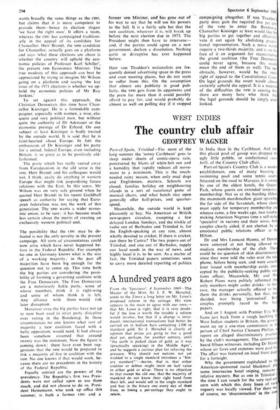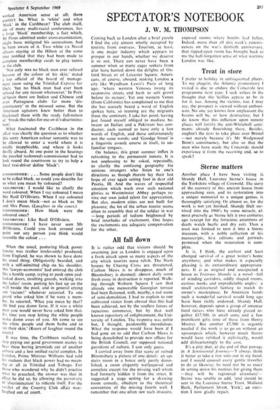WEST INDIES
The country club affair
GEOFFREY WAGNER
Port-of-Spain, Trinidad—For most of the long summer the 'sunny Caribbean' goes to sleep under sheets of comic-opera rain, punctuated by blasts of white-hot sun and a humidity that rapidly reduces all move- ment to a minimum. This is the much- needed rainy season, when only mad dogs and Englishmen, etcetera. Schools are closed, families holiday on neighbouring islands in a sort of vacational game of musical chairs, and what hotels stay open generally offer half-prices, and quarter- speed.
Meanwhile, the outside world is kept pleasantly at bay. No American or British newspapers circulate, excepting a few delayed London Sundays, and the trickle of radio out of Barbados and Trinidad is, for the English-speaking at any rate, almost wholly devoted to cricket. If there is cricket, can there be Castro? The two papers out of Trinidad, and one out of Barbados, supply our local needs in the way of news, and highly local it is, to be sure. As a matter of fact, the Trinidad papers sometimes seem to carry more detailed reporting of politics in India than in the Caribbean. And in this placid pool of gossip was dropped th ugly little pebble, or confectioned case belli, of the Country Club affair.
Port-of-Spain's Country Club is a mode' establishment, one of many boasting swimming pool and some tennis court. Situated on the road to Maracas, it is owne by one of the oldest hotels, the Queen' Park, whose guests are extended temporal. membership. Not so at the hustling Hilto the mammoth marshmallow giant sprawlin the far side of the Savannah, whose client must apply for temporary membership an whence came, a few weeks ago, two trouble making American Negroes (one a self-styl `specialist' in racism) and their wives. bot couples clearly aided, if not abetted, by a emotional public relations officer at th Hilton.
Dr and Mrs Leonard Hanna, of Detroi were annoyed at not being allowed mediate membership of the club. Ther could be no question of skin discriminatio since they were told the rules over the tel phone, before being seen, and were actual later issued with membership cards, inter cepted by the publicity-seeking public re tions officer. Meanwhile, Mr and M Robert Pious were politely informed th, only members might order drinks—in thei case, the manager actually offered to bu them the drinks personally, but that. lb decided, was being 'patronised'. Rot couples promptly raced to the loc papers. And on 1 August, with Premier Eric Wi Hams just back from a rough heckling It West Indian students in Britain, the gover ment set up a one-man commission in it person of Chief Justice Clement Phillips. t report on alleged discriminatory practic by the club's management. The commissio heard fifteen witnesses, including Dr Hann whose air fares and expenses were paid fo The affair was featured on local front P28 for a fortnight. Why the government capitulated to th American-sponsored racial blackmail. pi some internecine hotel sniping, remains relative mystery. But as one in Trinidad the time I can vouch for the very real co cern with which this dirty linen of raci roguery was locally viewed. For there wa of course, no 'discrimination' in the o worked American sense at all; there couldn't be. What is 'white and what 'black' in the Caribbean? The club itself, site of many multi-racial conferences, has a large 'black' membership, a fact which, Mr Pious admitted under cross-examination, might have mitigated his accusations, had he been aware of it. Two white us Naval officers staying at the Hilton at the same time testified that they had been made to complete membership cards to play tennis at the club.
'Not only was no black man ever refused because of the colour of his skin,' stated a top official of the board of manage- ment (now suing the Trinidad Express for libel), 'but no black man had ever been refused for any reason whatsoever.' In Port- of-Spain there are Indian and Chinese and even Portuguese clubs far more 'dis- criminatory' in the misused sense. But the American agitators knew better than to blackmail them with the ready full-nelson of `break-the-rules-for-me-or-it's-discrimina- tion'.
What fascinated the Caribbean in the affair was clearly the question as to whether this sorry American colour semantic was to be allowed to enter a world where it is totally inapplicable, and where it looks finally absurd. At one point in the hearings the puzzled (coloured) commissioner had to look round the courtroom to try to help a local taxi-driver define 'black':
commisstoNER: ... Some people don't like to be called black, so could you describe for us what you mean by coloured?
TAXI-DRIVER: I would like to clarify the word coloured. When I say coloured I mean like Basil D'Oliviera. When I say coloured I don't mean black—not as black as Mr and Mrs Pious. (Laughter in the court.) COMMISSIONER: How black were the coloured ones?
TAXI-DRIVER: Like Basil D'Oliviera. COMMISSIONER: I have never seen Mr D'Oliviera. Could you look around and point out any person you think would resemble the colour ...
When the usual, posturing black power fanatic was (rather irrelevantly) produced, from England, he was shown to have done his usual thing. Obligatorily bearded, and with a self-admitted chip on his shoulder, this 'lawyer-economist' had entered the club like a hostile camp, trying to push open pad- locked doors, insulting guards, walking into the ladies' room, putting his feet up on the wall beside the pool, and in general crying out 'racism!' whenever accosted. To one guard who asked him if he were a mem- ber, he retorted, 'What you mean by that? Ah find you damn farse. If it was a white man you would never have asked him that. It's time you stop letting the white people make damn asses of you. Ah come to see the white people and them bathe and to see their skin.' (Roars of laughter round the court.)
It was time, the Caribbean realised, to Stop paying out good government money to hear these boring jeremiads out of another culture and a less unified racial complex. In London, Prime Minister Williams had told his students that black power had no mean- ing at all in Trinidad and Tobago. For those who wondered why he didn't practise what he preached, the answer was that in effect he did so, by allowing the parrot-cry of 'discrimination' to ridicule itself. For the verdict of the Country Club affair was: laughed out of court.



































 Previous page
Previous page